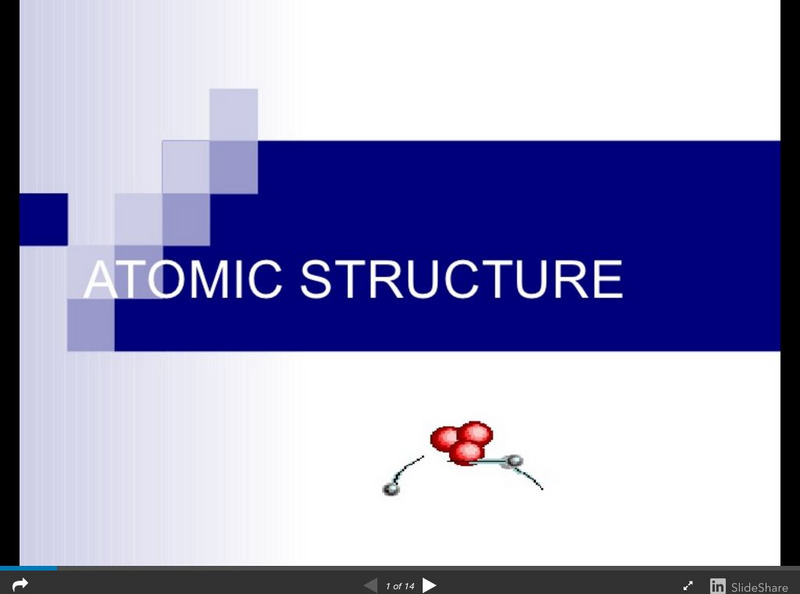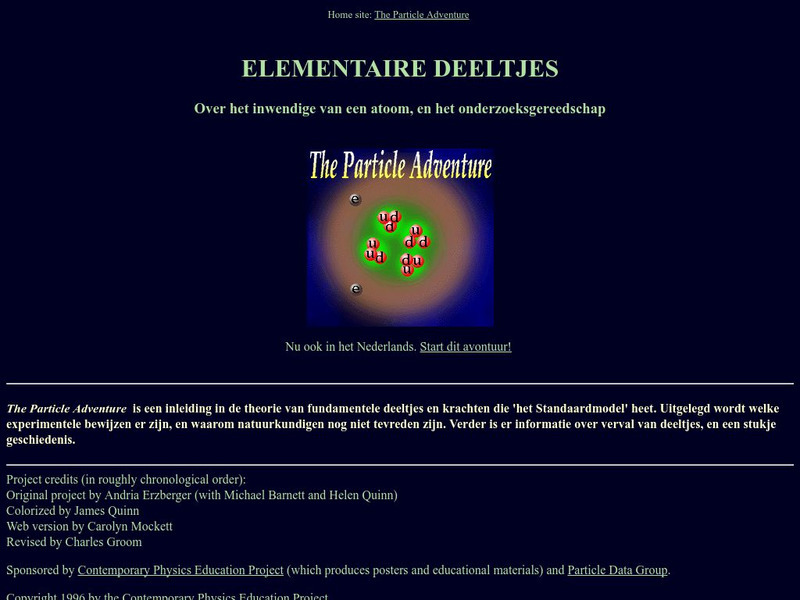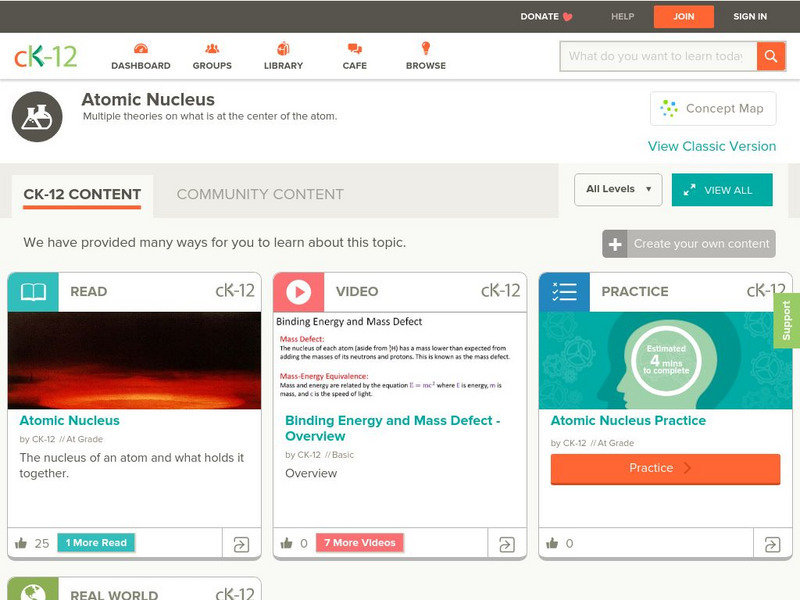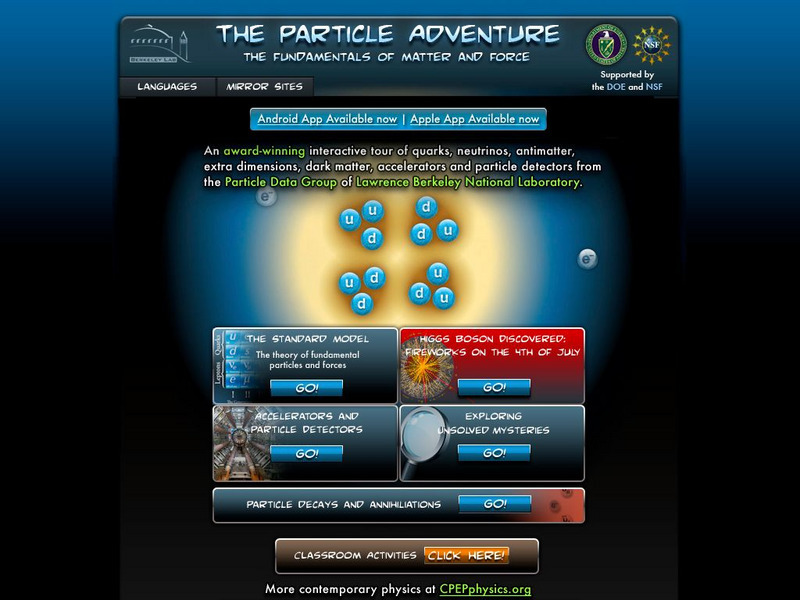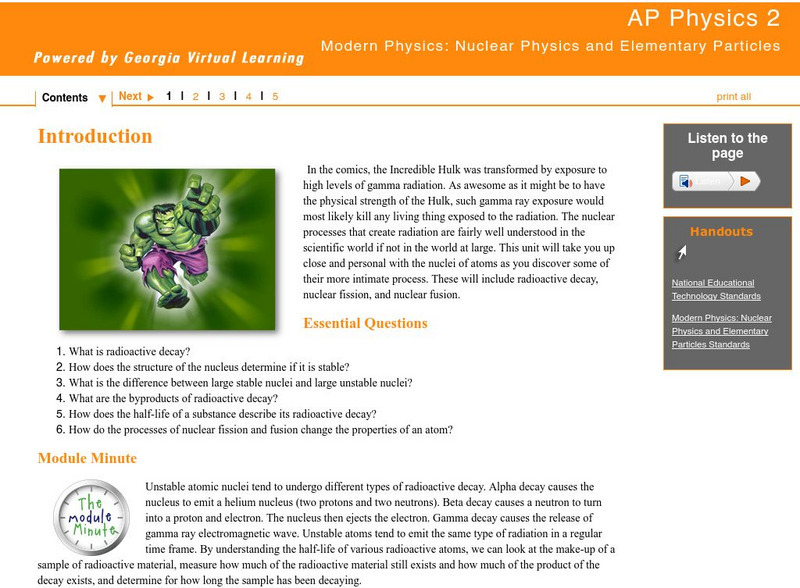CK-12 Foundation
Ck 12: Plix: Build Some Helium: Atoms to Molecules
[Free Registration/Login Required] Build your own helium atom and make sure it has the correct number of protons, electrons, and neutrons on this site. Site also includes a small quiz on the topic.
Tom Richey
Slide Share: Atomic Structure
Slideshow looking at the history of models of the atom, including those proposed by John Dalton, J.J. Thomson, Ernest Rutherford, Niels Bohr, and James Chadwick. Discusses subatomic particles, including the numbers of protons, neutrons,...
Concord Consortium
Concord Consortium: Atom and Ion Builder
Explore how changing the numbers of protons, neutrons, and electrons affect the type of atom.
Other
Particle Adventure Dutch Version
Dutch version of the well-known "Particle Adventure" physics website that teaches students about atoms, mass, particle physics, and quantum physics. The site discusses theories related to physics and provides other links related to the...
Lawrence Berkeley National Laboratory
Berkeley Lab: La Aventura De Las Particulas
Learn the fundamentals of particles and forces with this site. Explore the paths that explain matter in the universe.
CK-12 Foundation
Ck 12: Physical Science: Atomic Nucleus
[Free Registration/Login may be required to access all resource tools.] Discusses the nucleus of an atom and what holds it together.
Sophia Learning
Sophia: Isotopes: Lesson 9
This lesson will define an isotope and explain what happens if the number of neutrons in an atom changes. It is 9 of 9 in the series titled "Isotopes."
Sophia Learning
Sophia: Isotopes: Lesson 1
This lesson will define an isotope and explain what happens if the number of neutrons in an atom changes. It is 1 of 9 in the series titled "Isotopes."
Ducksters
Ducksters: Science for Kids: The Atom
Kids learn more about the science of the atom. Electrons, neutrons, and protons make up the smallest bits of matter.
ClassFlow
Class Flow: Element Math
[Free Registration/Login Required] In this flipchart students determine the number of protons, neutrons, and electrons of elements essential to life. They use Activotes to check knowledge gained. Students create a Bohr Model.
Science Struck
Science Struck: What Makes Up an Atom?
Describes the structure of an atom and the characteristics of the electrons, neutrons, and protons inside it. Includes some interesting facts about atoms.
Mocomi & Anibrain Digital Technologies
Mocomi: Structure of an Atom
An atom is made of three parts - protons, neutrons, and electrons. Here you can explore these different parts.
Quia
Quia: Mr. Snyder's Game of Atomic Terms
A short matching quiz on basic terminology related to atomic structure. Answers provided.
University of Colorado
University of Colorado: Ph Et Interactive Simulations: University of Colorado: Build and Atom
Build an atom out of protons, neutrons, and electrons, and see how the element, charge, and mass change. Then play a game to test how the ideas work!
University of Colorado
University of Colorado: Ph Et Interactive Simulations: Build an Atom
Build an atom out of protons, neutrons, and electrons, and see how the element, charge, and mass change. Then play a game to test your ideas!
Utah Education Network
Uen: Atomic Model Construction
Students create models of atoms then compare the various aspects of the atoms including; relative size, charge, positions of subatomic particles, and identity of the atom based on proton, neutron, and electrons with the class.
Lawrence Berkeley National Laboratory
Berkeley Lab: The Particle Adventure
Visit this site for an interactive tour of the atom and all aspects of particle physics. View the animations available with almost every description on this site. A great place for the fundamentals of particles and forces including a...
Other
Fermilab: Hyperons & Neutrinos
The third paragraph pinpoints the importance of hyperons in particle research. Hyperons and neutrinos share characteristics of the weak force. Complex stuff, but the real deal. Parts of this report may be very useful. Many photos, slow...
American Chemical Society
Middle School Chemistry: Periodic Table
Students explore the periodic table and learn the basic information given for elements: the name, symbol, atomic number, and atomic mass for each element.
CK-12 Foundation
Ck 12: Structure of the Atom
[Free Registration/Login may be required to access all resource tools.] Students learn about the important discoveries of subatomic particles, and how they led to our current understanding of the atom.
Georgia Department of Education
Ga Virtual Learning: Nuclear Physics and Elementary Particles
This interactive unit will take students up close and personal with the nuclei of atoms as they discover some of their more intimate process. These will include radioactive decay, nuclear fission, and nuclear fusion.
Annenberg Foundation
Annenberg Learner: Interactives: The Periodic Table
An interactive website where students learn about the basics of an atom, periodic tables organization, and the structure and properties of matter. Module includes an introduction and five lessons that are followed by a quiz and an...
Concord Consortium
Concord Consortium: Stem Resources: Atomic Structure
Introduces learners to atomic models of the past and present, focusing on the orbital model and an explanation of its basis. Learners then have the opportunity to "make an atom" and contrast it with an ion, followed by an isotope. The...
Concord Consortium
Concord Consortium: How Does an Object Become Charged?
Activity 1 in this module: What is the effect of changing the composition of an atom? Since all atoms contain protons, neutrons, and electrons, what makes one element different from another is examined.
Other popular searches
- Protons Neutrons Electrons
- Protons, Neutrons, Electrons
- Electrons, Neutrons, Protons
- Electrons, Protons, Neutrons
- Protons Neutrons, Electrons
- Atoms Neutrons Protons
- Protons Neutrons and Electrons
- Protons , Neutrons, Electrons



